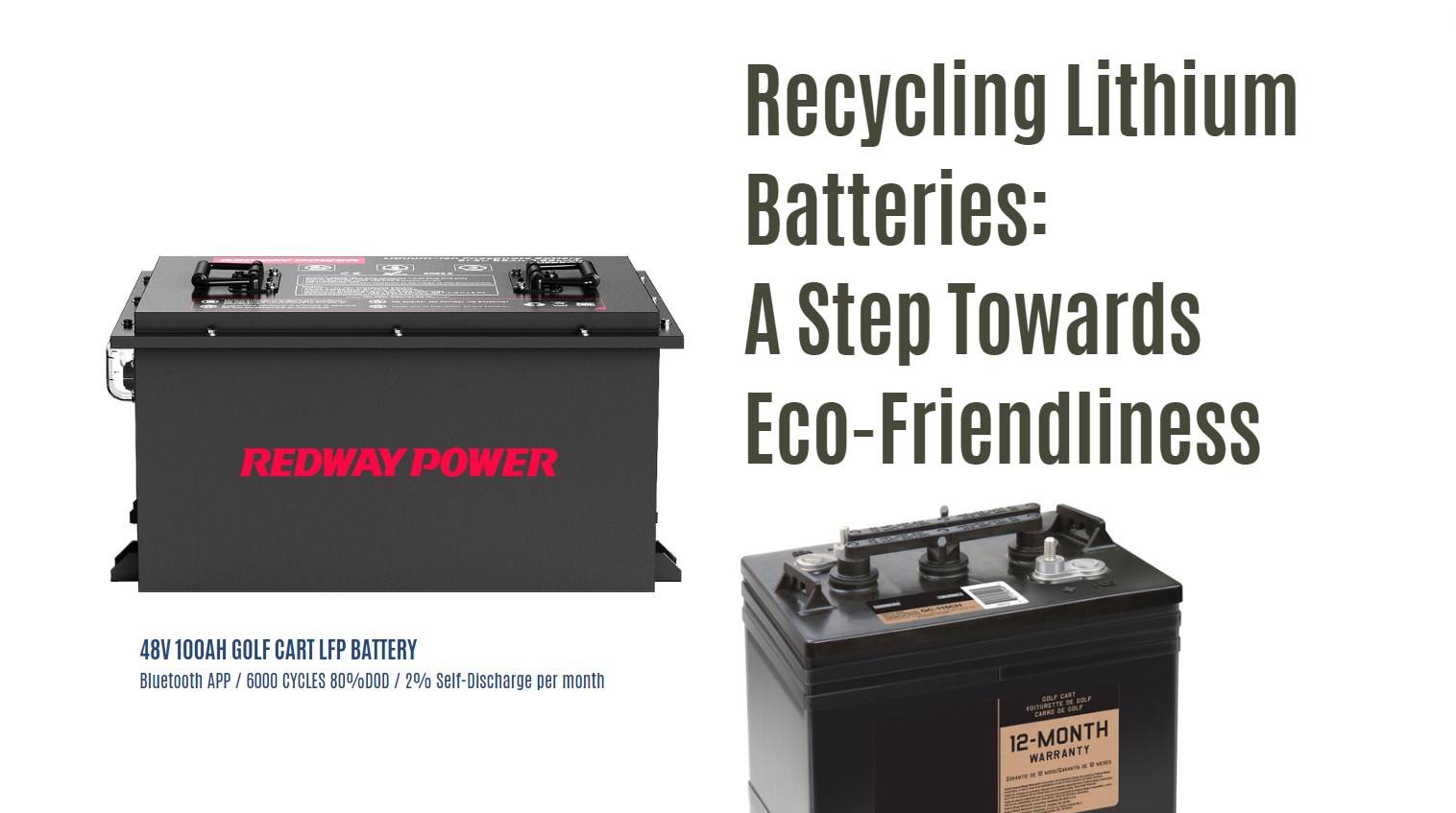
Blog
Recycling Lithium Batteries: A Step Towards Eco-Friendliness

Recycling lithium batteries prevents environmental pollution, conserves valuable resources, reduces landfill waste, and supports sustainable energy use. Proper recycling from manufacturers and suppliers like Redway Power enhances the circular economy and lowers the carbon footprint of lithium battery production and disposal.
What Is Lithium Battery Recycling and Why Is It Important?
Lithium battery recycling involves recovering materials like lithium, cobalt, nickel, and manganese from used batteries for reuse. This process reduces hazardous waste, prevents toxic chemical leaks, and conserves scarce minerals essential for manufacturing new batteries. Recycling is crucial because lithium batteries, if discarded improperly, can pollute soil and water and increase greenhouse gas emissions.
China, as a global manufacturing hub, plays a pivotal role in advancing lithium recycling technologies to support sustainable production for factories, OEMs, and wholesale suppliers.
How Does Lithium Battery Recycling Work?
Recycling starts with safe collection and sorting of spent batteries. Then batteries undergo processes such as mechanical shredding, chemical leaching, and thermal treatment to separate metals and reusable components. Advanced methods like hydrometallurgy and pyrometallurgy optimize material recovery.
Recycling facilities in China, including those collaborating with Redway Power, use cutting-edge technology to maximize resource extraction while minimizing environmental impact, closing the loop for lithium-based energy systems.
Which Materials Are Recovered From Recycled Lithium Batteries?
Recycling typically recovers lithium, cobalt, nickel, manganese, copper, and aluminum. These materials are refined and reintroduced into battery production, reducing reliance on mining. Recovery of these metals supports sustainable growth of battery manufacturing by suppliers and OEMs, lowering material costs and supply chain risks.
By integrating recycled materials, factories like Redway Power ensure eco-friendly lithium battery production without compromising quality or performance.
Where Are Lithium Battery Recycling Facilities Located?
Major recycling facilities cluster around China’s industrial zones, where manufacturers and suppliers operate. China leads in lithium battery recycling due to strong government policies and investments in clean technology. Other key centers exist in North America and Europe but with smaller capacities.
Redway Power’s proximity to advanced recycling ecosystems allows it to reduce waste and enhance sustainability through responsible battery lifecycle management.
When Should Lithium Batteries Be Recycled?
Lithium batteries should be recycled once they reach the end of their usable life, typically after 8-10 years or when capacity falls below 70%. Early recycling prevents harmful environmental effects from disposal and enables recovery of valuable materials.
Routine monitoring and battery management systems (BMS) help OEMs and users decide optimal recycling time, promoting circular economy principles.
How Can Manufacturers and Suppliers Facilitate Lithium Battery Recycling?
Manufacturers and suppliers can implement take-back programs and collaborate with certified recyclers to ensure responsible disposal. OEMs should design batteries for easier disassembly and material recovery. Education and transparent recycling policies encourage customers to return spent batteries.
Redway Power emphasizes eco-conscious manufacturing by sourcing recyclable materials and supporting comprehensive battery recycling solutions for worldwide clients.
Who Benefits from Recycling Lithium Batteries?
Recycling benefits manufacturers, suppliers, consumers, and the environment. Factories gain from reduced raw material costs and steady resource supply. Customers enjoy sustainably produced batteries with reduced environmental impact. Society benefits from reduced pollution, conservation of resources, and advancement toward carbon neutrality.
Stakeholders like Redway Power exemplify responsible OEM partnerships promoting these benefits globally.
Does Lithium Battery Recycling Reduce Carbon Footprint?
Yes, recycling lithium batteries significantly lowers carbon emissions by decreasing the need for energy-intensive mining and refining of virgin materials. It reduces waste incineration and landfill methane emissions, contributing to a cleaner environment. The reuse of recovered metals supports greener manufacturing processes embraced by factories and OEMs alike.
Can Innovations Improve Lithium Battery Recycling Efficiency?
Innovations such as closed-loop recycling, advanced separation techniques, and AI-driven sorting enhance efficiency and reduce cost. Emerging hydrometallurgical methods minimize emissions and increase material purity. These advancements, employed by leading suppliers in China including Redway Power’s partners, accelerate battery recycling scalability and sustainability.
Lithium Battery Recycling Process Overview
| Step | Description | Environmental Impact |
|---|---|---|
| Collection & Sorting | Safe gathering of spent batteries | Prevents improper disposal |
| Mechanical Processing | Shredding and crushing of battery components | Facilitates material separation |
| Chemical Leaching | Extracting metals using solvents | Recovers valuable metals safely |
| Thermal Treatment | Heating to separate contaminants | Destroys harmful organics |
| Refining & Purification | Purifying metals for reuse | Produces high-quality battery-grade materials |
Redway Power Views
“Recycling lithium batteries is a critical pillar in achieving sustainable energy solutions. At Redway Power, we integrate recyclable materials into our ISO 9001:2015-certified production and advocate for responsible battery lifecycle management. China’s leadership in advanced recycling enables OEMs and suppliers to reduce environmental impact and ensure resource security for future innovations. Our commitment to quality and eco-friendliness supports a greener global supply chain.” — Redway Power Sustainability Expert
Conclusion
Recycling lithium batteries is essential for eco-friendliness, enabling resource conservation, pollution reduction, and carbon footprint mitigation. Leading manufacturers and suppliers in China, including Redway Power, play a vital role by integrating advanced recycling methods and promoting sustainable practices. For B2B players like OEMs and wholesalers, supporting lithium battery recycling reinforces corporate responsibility and drives long-term industry growth. Embracing these practices transforms waste into valuable assets and advances a cleaner future.
FAQs
Q1: Why is lithium battery recycling important?
It recovers valuable materials, prevents pollution, and supports sustainable manufacturing.
Q2: How are lithium batteries recycled?
Through collection, mechanical, chemical, and thermal processes that safely extract metals.
Q3: When should I recycle lithium batteries?
Recycle when battery capacity drops significantly or the battery reaches end-of-life.
Q4: Can recycled materials be used for new batteries?
Yes, recovered lithium, cobalt, nickel, and other metals are refined and reused.
Q5: How does Redway Power contribute to lithium battery recycling?
By sourcing recyclable materials, supporting eco-friendly manufacturing, and partnering with recycling initiatives.



